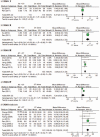Clinical effectiveness of acupuncture on Parkinson disease: A PRISMA-compliant systematic review and meta-analysis
- PMID: 28099340
- PMCID: PMC5279085
- DOI: 10.1097/MD.0000000000005836
Clinical effectiveness of acupuncture on Parkinson disease: A PRISMA-compliant systematic review and meta-analysis
Abstract
Background: Parkinson's disease (PD) is the second-most-common chronic and progressive neurodegenerative disease. The long-term use of levodopa leads to a loss of efficacy and to complications. Therefore, many patients with PD have turned to complementary therapies to help relieve their symptoms. Acupuncture is most commonly used as a complementary therapy in patients with PD. This paper presents a systematic review and meta-analysis of the effects of acupuncture for patients with PD. This study was performed to summarize and evaluate evidence regarding the effectiveness of acupuncture in the relief of PD symptoms.
Methods: Seven databases, namely, MEDLINE, EMBASE, the Cochrane Library, the China National Knowledge Infrastructure [CNKI], and three Korean medical databases, were searched from their inception through August 2015 without language restrictions. Randomized controlled trials (RCTs) were included if they contained reports of acupuncture compared with no treatment and conventional treatment alone or acupuncture plus conventional treatment compared with conventional treatment alone for PD symptoms. Assessments were performed with the unified PD rating scales (UPDRS) I, II, III, and IV and the total score, the Webster scale, and effectiveness rating. Methodological quality was assessed using the Physiotherapy Evidence Database (PEDro) scale and the Cochrane risk of bias (ROB).
Results: In all, 982 potentially relevant articles were identified; 25 RCTs met our inclusion criterion, 19 of 25 RCTs were high-quality studies (i.e., a score of 6 or higher). The included RCTs showed favorable results for acupuncture plus conventional treatment compared with conventional treatment alone in the UPDRS II, III, and IV and the total score. Acupuncture was effective in relieving PD symptoms compared with no treatment and conventional treatment alone, and acupuncture plus conventional treatment had a more significant effect than conventional treatment alone.
Conclusions: We performed a systematic review and meta-analysis to evaluate the use of acupuncture for relief of PD symptoms and found that acupuncture has significant positive effects. Acupuncture can be considered as a combination treatment with conventional treatment for patients with PD. Further studies on this topic should be carried out according to rigorous methodological designs in both the East and the West.
Conflict of interest statement
The authors have no conflicts of interest to disclose.
Figures
References
-
- Mateus C, Coloma J. Health economics and cost of illness in Parkinson's disease. Eur Neurol Rev 2013;8:6–9.
-
- Davie CA. A review of Parkinson's disease. Br Med Bull 2008;86:109–27. - PubMed
-
- Shobha S, Rao MD, Laura A, et al. Parkinson's disease: diagnosis and Treatment. Am Fam Physician 2006;12:2046–54. - PubMed
-
- Samii A, Nutt JG, Ransom BR. Parkinson's disease. Lancet 2004;363:1783–93. - PubMed
-
- Sara V, Zoe B, Roger R, et al. Treatment of advanced Parkinson's disease. Parkinsons Dis 2010;2010:1–9.
Publication types
MeSH terms
LinkOut - more resources
Full Text Sources
Other Literature Sources
Medical
Molecular Biology Databases
Miscellaneous





